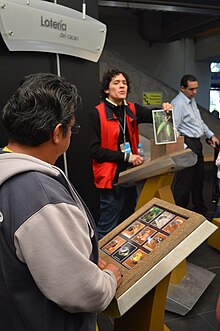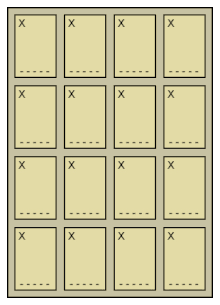Lotería
Lotería is a traditional Mexican game of chance that is similar to bingo . Unlike bingo, it is not played with numbers, but with pictures.
Game flow
Lotería is the Spanish word for lottery . Each player has a board with a randomly created 4 x 4 grid of pictures (the tabla ), which he chooses from a large number of different tablas , each containing a different selection of pictures, before the game starts. In addition to a designation, each motif is also assigned a number, which, however, is of no importance for the course of the game.
The card sheet of 54 cards, each with a different motif, is shuffled at the start of the game by the crier ( el cantor , the “singer”, also called el gritón , the “ screamer ”). Then the crier reveals one card after the other from the stack and tells the players which motif was drawn. The motif can be called out by name or alternatively be described with a short riddle, for example: El farol de los enamorados. ("The street lamp of lovers"). The solution is La Luna (“the moon”), which corresponds to picture no.
Every player who finds the motif of the called out card on his tabla marks it with a chip or a token. In Mexico, small stones, bottle caps or pinto beans are traditionally used. The winner is the one who is the first to shout “¡Lotería!” (In some areas of Mexico “¡Buenas!”) As soon as he has completed a previously agreed arrangement with pieces, such as
- a horizontal line
- a vertical line
- a diagonal line
- four in a corner
- four inside
- one in each corner
variants
A variant of the traditional game is the Lotería de Pozo . A Pozo is a square group with 3 pictures (a whole motif and two half, whereby the half motifs with those of neighboring Pozos depict a complete motif). The goal is to be the first to reach a predetermined number of pozos in a predetermined order.
There are also card variants for special occasions such as bachelor parties and baby showers , in which the motifs are adapted to the occasion.
history
The game originated in Italy in the 15th century and was brought to New Spain (modern-day Mexico) in 1769 . Initially a hobby of the upper class, Lotería gradually became a traditional game at Mexican fairs.
The French businessman Don Clemente Jacques created a version in 1887 which he successfully marketed. The motifs of his edition "Don Clemente Gallo" have become icons of Mexican culture and are enjoying increasing popularity in the USA and some European countries. Other Lotería sets include Lotería Leo , Gacela and Lotería de mi tierra .
In the 1930s, the Catholic Church developed its own version of the Lotería. The cards showed motifs related to Catholicism instead of the traditional images.
The Millennial Lotería set, published in 2017 , took up current political and social issues and combined them with traditional motifs in a satirical manner.
On December 9, 2019, Google honored the game on the occasion of the 106th birthday of the copyright of the “Don Clemente Gallo” edition from 1913 with a Google Doodle , with which Lotería can be played interactively. Some of the traditional motifs have been replaced by others; for example there is the motif El Buscador (“the search engine”).
literature
- Ilan Stavans : ¡Lotería! or, The Ritual of Chance , in: AGNI 58, October 15, 2003 ( agnionline.bu.edu )
- Stacy Alex: La Lotería Mexicana - Playing with Heteronormativity . In: The Routledge Companion to Gender, Sex and Latin American Culture (Ed .: Frederick Luis Aldama). Routledge Publishing, 2018 ( limited preview in Google Book Search).
Web links
- History of La Lotería . About the history of Lotería on the website of the American artist Teresa Villegas
Individual evidence
- ↑ Text accompanying the exhibition ¡LOTERÍA! Mexico's Game of Chance and Poetry June 28 - September 27, 2014, Casa Dolores, Center for the Study of the Popular Arts of Mexico, Santa Barbara, California. Accessed February 1, 2020 (English / Spanish)
- ↑ Loteria Mexicana - Mexican Bingo , game description, accessed on February 1, 2020 (English)
- ↑ Loteria de Pozo , game description, accessed on February 1, 2020 (English)
- ↑ Loteria Collection des Clemente Jacques, Series 1 from the 1920s , loteria.elsewhere.org (Joshua Larios), accessed February 1, 2020.
- ↑ KE Thomas: From 'El Man Bun' to 'La Border Wall', Millennial Lotería speaks to new generation , Public Radio International (PRI), March 19, 2019. (English)
- ↑ In honor of the game "Lotería" , Google Doodle of December 9, 2019.


